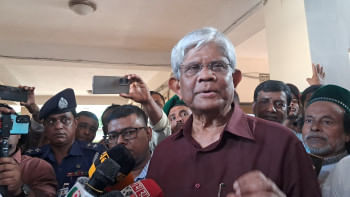Patients suffer at NICVD
Mohammad Abdur Rahim Sheikh was taken to NICVD emergency department from Noakhali with severe chest pain on September 22. After carrying out an ECG test on him, nurses asked his attendants to meet the emergency doctor.
The doctor checked the ECG report and advised them to immediately take Rahim to the Coronary Care Unit (CCU). They looked for a trolley to take him to the CCU but found none and had to seek help from a ward boy in this regard.
Within five minutes Shabir Chowdhury came after having a major cardiac arrest at his Mohammadpur house and the same process was repeated.
He was also referred to the 38-bed CCU and his family members had to go through the same experience. It took more than 10 minutes each for such critical patients to complete the procedures at the emergency department. Finally they were allowed to go to the already overcrowded CCU.
Many patients are brought to the hospital in a critical condition, but there is not much emergency support at the country's lone specialised public cardiac hospital -- National Institute of Cardiovascular Diseases (NICVD).
The hospital also lacks the facilities which are supposed to be there in case of dealing with many critical patients.
According to cardiologists, the emergency department of the hospital must have different emergency supports as cardiac patients are different from others. They need all-time support if their condition is critical, said a cardiologist working at the hospital.
The doctors alleged the emergency department could not be equipped with necessary equipment due to bureaucratic tangles and corruption. As a result, patients are being deprived of required treatment.
There are only five beds at the emergency department with only two ECG machines. Two to three nurses and one or two on duty doctors are posted at the department, which is full of patients most of the time.
According to a director of the hospital, they receive 400 patients on average every day.
There are no air conditioning system, monitors, which are crucial to check patients' heart condition, pulse oximeter, syringe pump, nebuliser machine, and intubation set at the department. Though there are five beds each at the emergency and observation rooms, there are only two defibrillator machines at the observation room and four oxygen support machines.
“We send patients to the CCU directly if their condition is critical. It would be much better for patients if we had modern equipment along with other logistic supports,” the director told The Daily Star.
Resident physician Dr Pijous Biswas said they have been trying their best with the limited resources to provide maximum care to the patients. He admitted that when the number of patients increases it becomes very tough to offer good care.
Contacted, Director of NICVD Prof STM Abu Azam said he has been trying to modernise the emergency department. “Earlier it had no modern ECG machine. I have brought four ECG machines, repaired the AC, installed new oxygen machines, among others,” he added.
“I am trying to expand the facility with two seven-storey extension buildings. Then I will establish an emergency unit with all modern facilities,” he said.

 For all latest news, follow The Daily Star's Google News channel.
For all latest news, follow The Daily Star's Google News channel. 



Comments